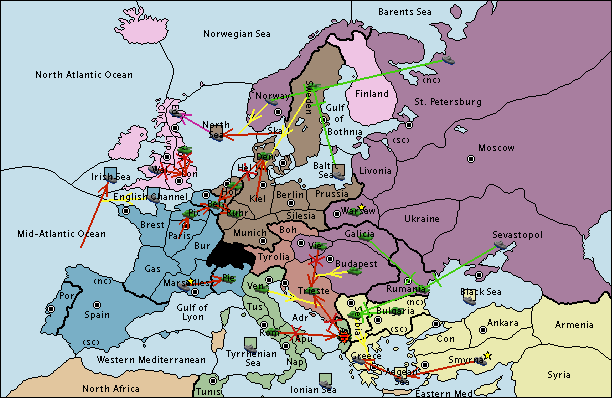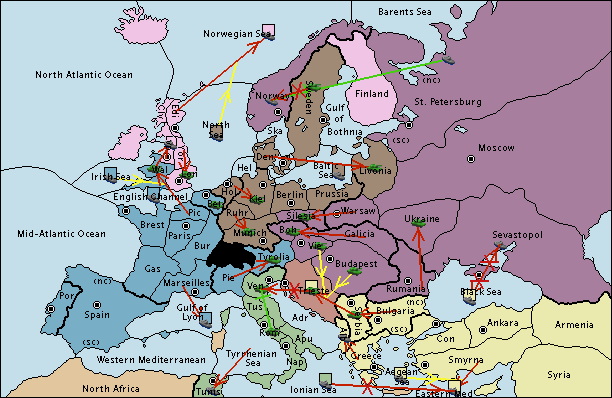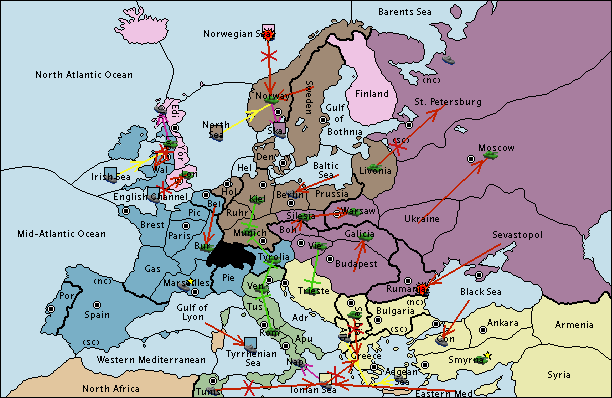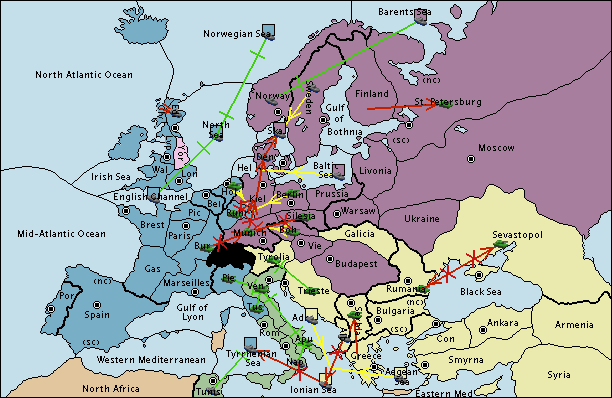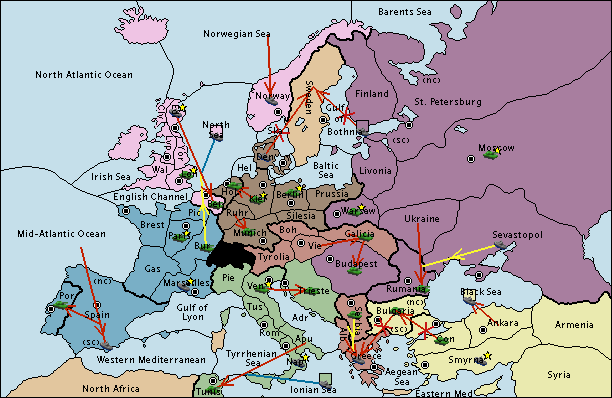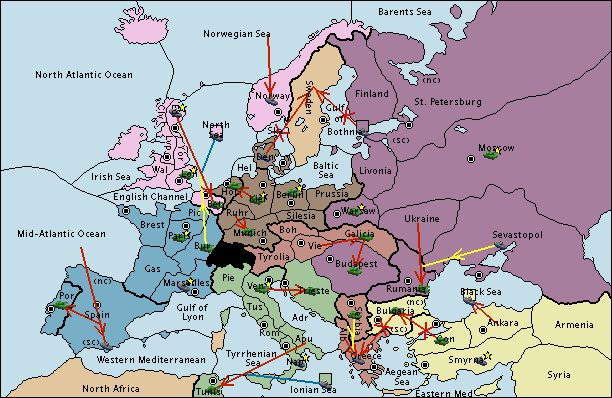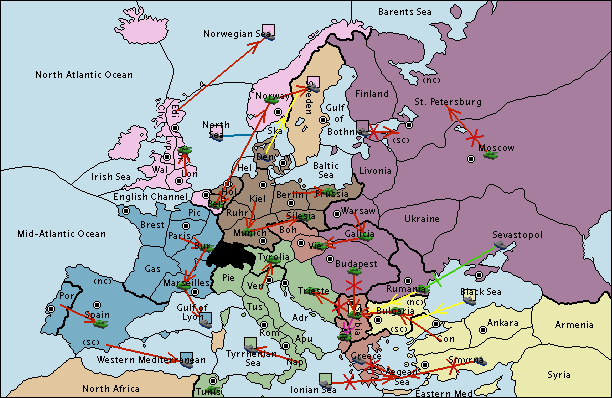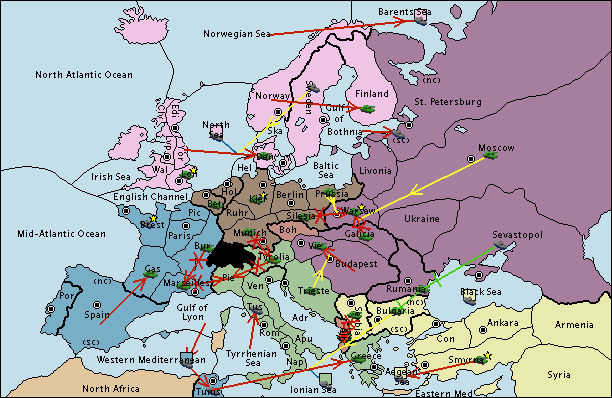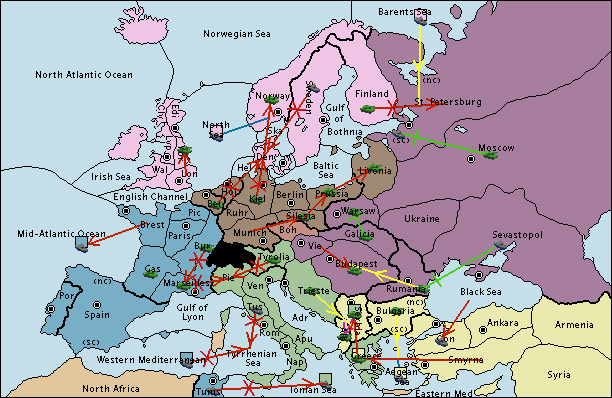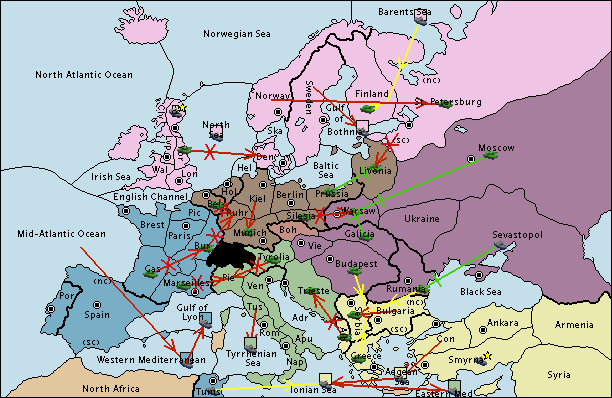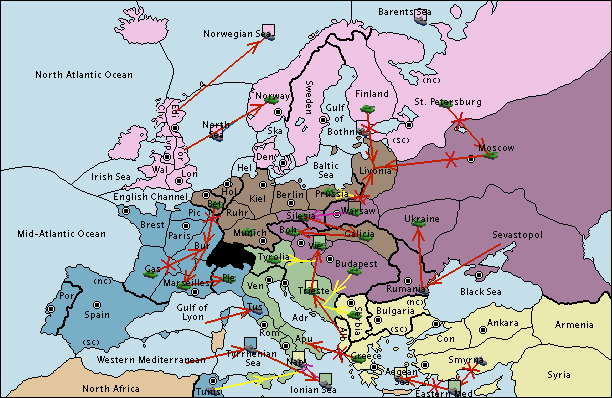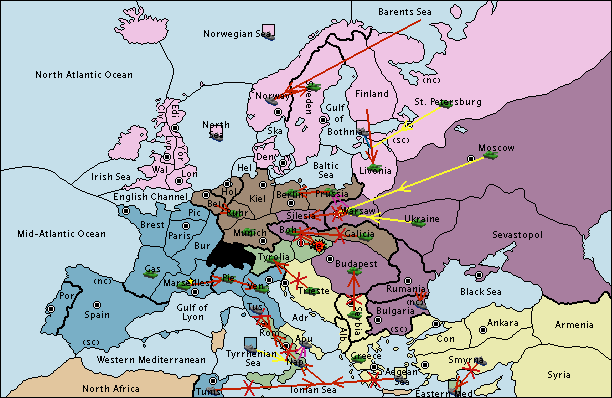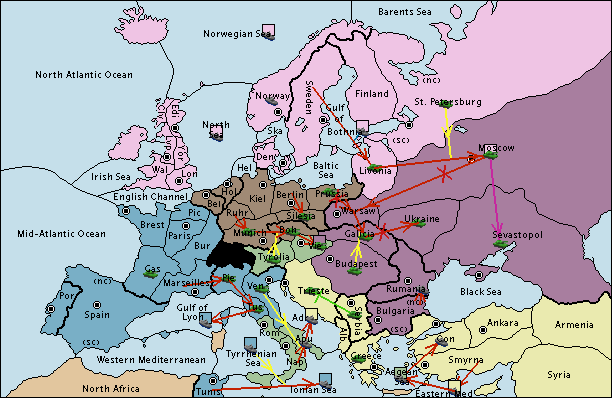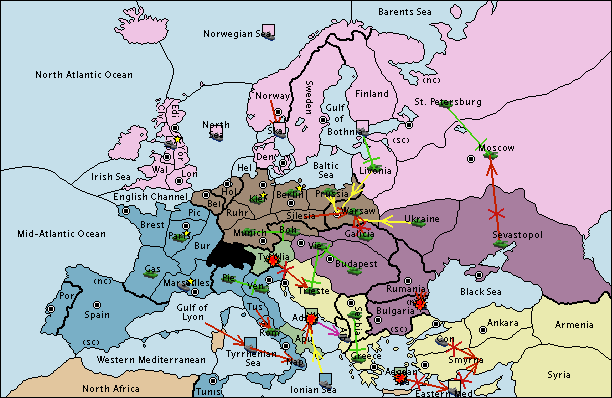Despite the simplicity of the board and the rules, Diplomacy is among the most psychologically complex of games. The players have the ability and incentive to manipulate each other. Every move can be imputed with a half-dozen possible meanings. Like the dark of night, deception shrouds every match, every player, and every move. The inexperienced player will find this darkness impenetrable. They fumble about like a daytime creature who stayed out after nightfall. They will become the victim for nocturnal predators.
Sometimes, confusion and anxiety can bring you down on their own. Misperception and paranoia can defeat you as much as any rival.
When your hair stands on end, is a predator stalking you? Or are you just “seeing things?”

An inexperienced player can be overwhelmed at how much hidden meaning is layered behind every subtle word of their rivals. They blunder about loudly in the dark with gratuitous honesty and needless deception.
There is a way to penetrate the darkness. To illuminate the shadows of subtlety, manipulation, and deception, you must hone senses that you do not depend upon in the light of day. You must discipline your mind so that you are able to perceive what is “really there.”
To Understand Lies, You Must First Understand Truth
This article is not about how to spot specific deceptions. Although there are artifacts of deceit (usually called “tells”), and although I know many of these tells and can teach you how to notice them, I will leave that topic for a future post. Even the concept of “lying”—an idea so simple and vivid that small children understand it—fades into hazy darkness as players deploy incomplete information, spin misleading truths, or make statements with deliberate indifference to whether they are true or false.
Before I can teach you how to spot lies and manipulations, I must first teach you what is actually happening in a Diplomacy match. In other words, you cannot understand lies without first understanding truth. A strong grasp of the truth is—by far—your greatest asset is seeing through lies. And not only that, but when you possess an accurate mental model of what can take place in Diplomacy, you may learn as much or more about a particular match by analyzing what you know to be false statements than by analyzing true ones. When you identify them for what they are, lies (ironically) may reveal far more about the liar’s inner thoughts than a truth of which you were already aware.
You can detect your opponents’ deceptions. You can use your detection to enhance your understanding of the match. I will provide you with mental tools you can use to cast light on the darkness. And perhaps most importantly, I will tell you what you are actually looking for.
Today We Talk about Onions
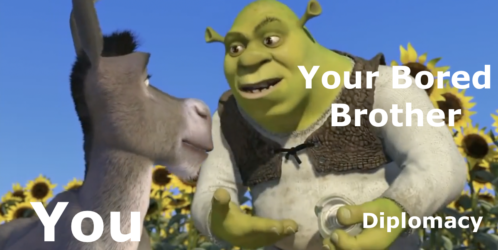
Shrek: For your information, there’s a lot more to Diplomacy games than people think.
Donkey: Example?
Shrek: Example? Okay, um, Diplomacy games…are like onions!
Donkey: They stink?
Shrek: Yes. No!
Donkey: Oh, they make you cry?
Shrek: No!!
Donkey: Oh, you leave them out in the sun and they get all brown and start sprouting little white hairs.
Shrek: NO!! Layers!! Onions have layers. Diplomacy games have layers. Onions have layers. You get it! They both have layers.
Donkey: Oh, they both have layers, oh. You know, not everybody likes onions.
There are 3 layers to every match of Diplomacy:
The Political Layer
The Tactical Layer
The Strategic Layer
In this article, I will tell you about the outermost of these three layers: the Political Layer.

The Onion’s Surface: The Political Layer
Diplomacy is an inherently Political game. Not Political in the sense of “law and government,” but Political in the sense of “office politics.”

In any match of Diplomacy, the players must keep track of Politics such as:
- Who likes whom?
- Who hates whom?
- Who seems to be working with whom?
- Who seems to be listening to what I have to say?
- What is each player’s reputation?
- Who owes me favors and to whom do I owe favors?
- Who do I like?
- Who do I trust?
There is an endless list of this kind of Politics. The Political Layer consists of all the things that the players say to each other and the feelings they feel about each other. The Political Layer is where players make deals, try to gain trust, tell lies, and make friends. (And sometimes they create enemies through sheer rudeness…)
At the start of a new Diplomacy match, the Political Layer is, without any doubt, the most important layer. All Diplomacy players make their alliance decisions, initial moves, and attack plans partly based on the impressions their neighbors make on them. Many players make their early decisions entirely based on who sends fun, friendly, or thoughtful messages and who sends annoying, selfish, or trite messages. You can’t win without attacking somebody; why not pick off players you don’t want to talk to? This corollary thus follows: a wise player uses the start of the match to generate as much goodwill as possible.
Always Advance Your Political Knowledge
From the first turn and every turn after that, constantly use your press to scout the Political landscape. If you are Italy, don’t just figure out whether you like Turkey; don’t just try to find out whether Russia likes you—find out whether Turkey likes Russia. Not only can you push Turkey and Russia for this information (compare their stories!), but you can also ask all the other powers for what they know (Turkey might be speaking freely with England, who could pass that information to you!). Understanding whether there is (or will be!) war, peace, or alliance between Russia and Turkey is essential knowledge for every power, and particularly Italy.
Your goal is to build up in your mind a mental model of what is taking place, Politically, in your match. To succeed, you must gain a correct understanding of each players motivations, desires, intentions, and plans. Unfortunately for you, your rivals have a huge incentive to hide these truths from you. This makes your task difficult, because not only will the players try to block your effort to understand them (with deceptions and manipulations), but the existence of your rivals’ incentive to hide the truth is itself a barrier (because you must be skeptical of every statement, even ones that are truthful).
Gather as much Political information as you can; every statement, every rumor, helps improve your understanding. You should pay attention even to players who are lying to you. Recognize the lie as such, and then ponder the hidden truth: your rival must be lying for a reason.
If the Political information you gather becomes too much to store mentally (this can happen when an online match lasts weeks or months), make notes. I often make written notes not for the purpose of remembering per se, but rather to bring order to a jumble of complicated ideas. I personally believe that I did well in the matches I recorded for my journals because the process of writing the journals forced me to take notes and think deeply about the matches.
Politics Always Matters, Even with Respect to Enemies You are Attacking
Example #1: Peacefully Destroy (Oct 2018—Jan 2019)
In this match, I played as Russia. I agreed to play a “Juggernaut” alliance with Turkey right from the start, and we played that alliance until the match ended.
Well, I must admit/brag that I am a Tactical genius at fighting a war for Scandinavia. I am a hardened veteran of Gunboat Diplomacy, which I believe taught me how to make flawless Tactical choices when on the offensive—but more on that later!
More importantly, and more relevant to this section: I showered Germany with manipulative messages that hollowed out Germany psychologically, defeating my opponent’s defenses mentally in order to overcome those defenses physically. In Germany’s own words, after the match:
Of note: France claimed to have ignored much of my press. Of this, I am very proud. Although the match was created as an anonymous game, I eventually deduced that France was a student and friend of mine. Accordingly, I tried harder than ever to manipulate that player. Nevertheless, France resisted my manipulations, which was definitely the right choice because I was plotting on a solo-win run if I succeeded in manipulating France.
“Legit psycho” ranks among my favorite names I’ve been called in a Diplomacy post-game discussion. (“Despicable clown” is probably my #1 favorite.)
Example #2: Apocolipstick (Feb 2018—Jan 2019)
Apocolipstick wasn’t just any old pick-up Diplomacy match. The players had been recruited to play the game from among the top players on webDiplomacy. Each of the players had the webDip points (fake tokens the players can bet on games), Ghostrating (kind of like an Elo ranking system), and community reputation for me to say, without hesitation or qualification, that this was a match between highly skilled players. The players had to wager 643 points just to participate (webDip players start with 100 points, so to even have 643 points to wager is an indication of considerable experience). Because of the huge bet size and the need for several long pauses, this match was the highest-bet ongoing match on webDiplomacy for about 1 year.
I have emphasized the quality of the players in this match so that you believe what you are about to read is not coincidental, unintended, or a fluke. FYI: The match was not anonymous; the usernames were visible to all players.
To help you understand this example, I am going to paraphrase a lesson I learned from a most excellent book (recommended to me by my favorite Diplomacy student!), The 48 Laws of Power by Robert Greene (1998):
Law 4: Always Say Less than Necessary
Speaking less will make people reveal more about themselves. Silence will put them on the defensive, and they may nervously jump in to fill the silence with all kinds of comments that reveal valuable information about them (including their weaknesses).
Silence makes people uncomfortable. Human beings impulsively interpret and explain things, including other people. They just have to know what you are thinking. By controlling what you reveal, they cannot discern your hidden intentions.
When you finally speak, your every word will gain extra attention and credibility. People assume that what you are saying must be important.
Greene gives the example of Louis XIV, King of France. A talkative man by nature, he spoke rarely as king and this kept others around him off-balance. Because nobody knew exactly where he stood, none could predict his reactions. No one could deceive him by saying what they thought he wanted to hear, because they did not know what he wanted to hear. Everything he said and did seemed important and valuable because of the sparseness of his words.
Summarized from The Laws of Power
Now, dear reader, if you know anything about Your Bored Brother, it’s that he loves to write and write and write. As given in my previous example, my press can fall on another player like an avalanche. So how did I put this lesson from The Laws of Power to use?
I’m going to juxtapose the screenshots showing my attack on Italy advancing with a few excerpts from Italy’s messages to me. I am showing the map as it looked in the year described (in other words, the way the map looked when I received the messages)—not the results of the orders of that turn (which is normally how these maps are labelled on webDiplomacy).
By the way, Turkey did not leak Italy’s orders. On sheer intuition, I guessed (correctly) that Turkey would support Italy’s convoy to Greece and that Italy would not cover Tunis with the fleet at Tyrrhenian Sea. However, I led all the other powers to believe that Turkey had betrayed Italy’s trust in this regard, anticipating that evidence of Turkey’s “betrayal” would find its way back to Italy and drive a Political wedge between the two of them.
We talked.
Thus I completed the swiftest, easiest, and most thorough destruction of Italy by France I have ever achieved (or even witnessed).
Don’t think for even one second that I got away with this because my target was a poor player; ghug is a formidable Diplomacy player, by reputation and by any metric. As of this writing, ghug far outranks me on webDiplomacy’s Ghostratings metric for Press Diplomacy (ghug ranks in 7th place, and I merely rank 33rd).
But in this match, I think I used my Political skills to get the better of ghug.
I specifically targeted ghug because I considered him such a strong opponent (the match was not anonymous). And I decided to stop sending messages to ghug precisely because I thought that The Silent Treatment would have a maddening effect on a player of such caliber during a match of big stakes and high expectations. In my mind, I imagined that ghug kept thinking that his Political skills should get him out of his precarious situation, and that by denying him any response I was making him more and more desperate to cut a deal with me.
After the match, ghug himself argued with me that my success was entirely coincidental or that my method was even counter-productive:
I’m putting ghug’s words in this post so you can make up your own mind about the matter, but I respectfully disagree:
If your opponent is of choleric temper, seek to irritate him. Pretend to be weak, that he may grow arrogant.
Sun Tzu, The Art of War
I think it was advantageous to me that ghug thought I was a coward, that ghug believed I was “a gunboater out of [my] depth” (I do play a lot of Gunboat Diplomacy), and that ghug was irked by what I did:
- I love it when my opponent underestimates me. Sandbagging (a jargon term for when a player in any game or contest pretends to be weaker than they really are) can be a very effective approach to the Political Layer. Appearing too weak may cause players to consider you an easy meal… but feigning a certain degree of inexperience and/or incompetence will cause your rivals to grow arrogant and to target those who seem like greater threats.
- Upsetting players is a great way to make them easier to manipulate. Diplomacy is a game where you are allowed (and indeed, encouraged) to drive others to their mental breaking point. The key is to upset the player just enough to get what you want, and not so much that they decide that ruining your match is their #1 goal. Whenever someone tells that they “almost” or “were about to” come after me, I conclude that I played the game well.
In any event, I don’t recommend using The Silent Treatment as a matter of course. An inexperienced or weak player, having low expectations, would be difficult to irritate with such a method. You’ll probably just end up ignoring each other.
Over-valuing the Political Layer is a Common Mistake
Please do not forget what I said earlier: Politics is the most important at the start of the match. However, as the board develops and players start developing their Tactical positions, the importance of Politics wanes and the importance of Tactics waxes. Players with strong positions decide to backstab friendly allies. Players who seemed bitter enemies with irreconcilable differences patch things up against a common threat.
Some inexperienced players make the following mistake about the Political Layer: they believe that a match of Diplomacy consists entirely of these Politics. Although Politics are an essential part of the game, the Political Layer is but one layer of the match—it is not the whole thing. This mistake will eventually lead you to be backstabbed by your more Tactically or Strategically minded allies. For a vivid demonstration of how this happens, read my journal for the 2019 Online Diplomacy Championship. My ally and I completely trusted and liked each other, but I backstabbed my ally anyways because I engineered a Tactical and Strategic opportunity that I decided to take advantage of.
The Political Layer is where you use your words to persuade, negotiate with, and manipulate your rivals. However, negotiation without Tactical acumen invites a bad deal. And manipulation without a Strategy is frivolous. To understand the Political Layer in this regard, we must peel back the Onion back to discover deeper layers…
